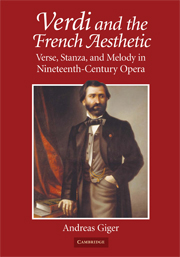Book contents
- Frontmatter
- Contents
- Acknowledgments
- Introduction
- Part I VERSIFICATION AND MELODIC AESTHETICS
- Part II FRENCH MELODY IN VERDI'S OPERAS
- 3 Jérusalem and its influence on the subsequent Italian operas
- 4 Les Vêpres siciliennes and its influence on the subsequent Italian operas
- 5 Don Carlos and after
- Appendix: Principal theoretical texts cited (arranged in chronological order by date of publication)
- Notes
- Bibliography
- Index
5 - Don Carlos and after
Published online by Cambridge University Press: 22 September 2009
- Frontmatter
- Contents
- Acknowledgments
- Introduction
- Part I VERSIFICATION AND MELODIC AESTHETICS
- Part II FRENCH MELODY IN VERDI'S OPERAS
- 3 Jérusalem and its influence on the subsequent Italian operas
- 4 Les Vêpres siciliennes and its influence on the subsequent Italian operas
- 5 Don Carlos and after
- Appendix: Principal theoretical texts cited (arranged in chronological order by date of publication)
- Notes
- Bibliography
- Index
Summary
This is Meyerbeer! said the crowd while exiting, after having applauded.
Le petit journal, March 13, 1867All in all, the work was what it was supposed to be, a French opera, not an Italian opera.
La Patrie, March 18, 1867Aspects of versification and Verdi's musical response
In 1865, Verdi was in frequent contact with Léon Escudier, his publisher in France, about the revisions of Macbeth for the Paris Opéra. Although Émile Perrin, the Opéra's director, preferred to mount this revised opera rather than revive one from the repertoire, he still hoped to entice the maestro to compose an entirely new work. Verdi refrained from committing himself but sent signals, though negative overall, that left a door open for a new commission; it was clear that the final decision would depend on a suitable libretto. Perrin accordingly dispatched Escudier to Busseto, along with a libretto titled Cleopatra and a scenario for Don Carlos. Of these and other possible topics, Verdi considered Don Carlos the best by far, and by the end of August 1865, the Opéra and the composer had come to a basic agreement for a new production. At the beginning of December, Verdi joined Joseph Méry and Camille Du Locle in Paris to work on the libretto for Don Carlos, and by the time the composer returned to Sant'Agata in March 1866, the libretto was nearly complete, except for the final version of act V.
Just as in 1847 with Jérusalem, Verdi's presence on site rendered written correspondence between librettists and composer unnecessary.
- Type
- Chapter
- Information
- Verdi and the French AestheticVerse, Stanza, and Melody in Nineteenth-Century Opera, pp. 182 - 228Publisher: Cambridge University PressPrint publication year: 2008

